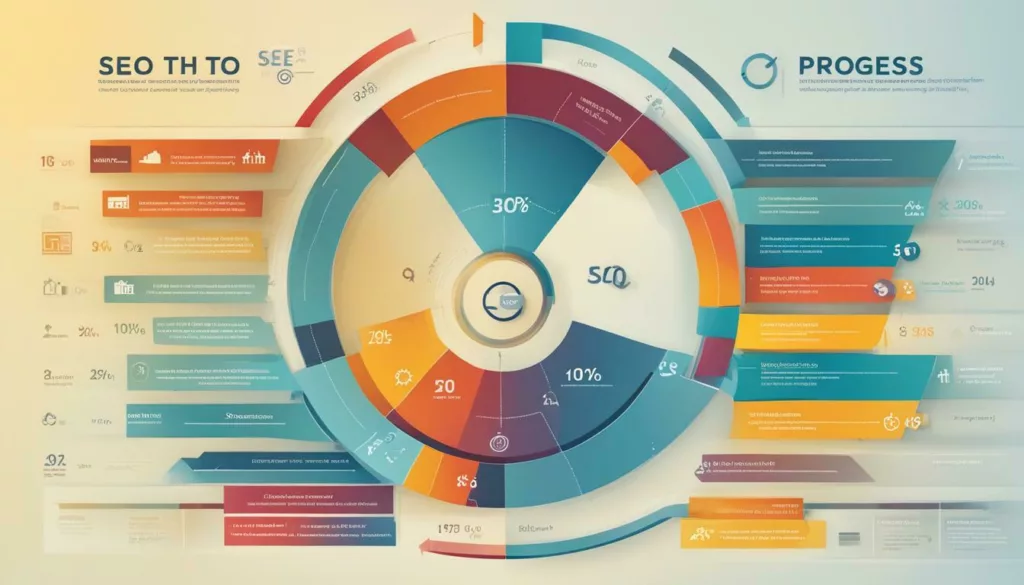Wondering how long it takes for SEO to show results? Let’s find out! Search Engine Optimization (SEO) is a powerful digital marketing strategy that aims to improve your website’s visibility and rankings on search engine result pages. However, it’s important to have realistic expectations about the timeline for seeing the impact of your SEO efforts.
SEO is not an overnight solution; it requires time, effort, and patience. The exact timeframe for SEO results can vary depending on various factors.
It’s important to approach SEO as a long-term strategy, as consistent effort and monitoring are crucial for sustained success. By staying committed and adapting to the ever-evolving SEO landscape, you can position yourself ahead of the competition and achieve your desired SEO results.
The timeline for SEO results is influenced by several factors that can affect the visibility and performance of your website. Understanding these factors can help you manage your expectations and make informed decisions when implementing SEO strategies.
The age of your website can impact the speed and effectiveness of your SEO results. Older websites often have accumulated backlinks and a larger content base, which can contribute to higher rankings. However, newer websites can still achieve successful SEO outcomes by focusing on creating high-quality content and building relevant backlinks.

The level of competition for specific keywords can also influence the time it takes to achieve desirable SEO rankings. Highly competitive keywords may take longer to rank for, as other websites are also vying for the top positions. It’s important to conduct thorough keyword research and consider targeting less competitive keywords to see quicker results while gradually working towards ranking for more competitive terms.
The speed at which you see SEO results can be influenced by the resources you allocate to your SEO efforts. Building a solid foundation with a well-structured website, implementing effective on-page optimization, and consistently creating high-quality content can all contribute to faster results. Additionally, investing time, budget, and expertise in SEO can help expedite the process.
A well-planned and executed SEO strategy can significantly impact the speed and effectiveness of your results. By following best practices, implementing the right optimization techniques, and staying up-to-date with industry trends, you can enhance your chances of achieving faster and more impactful SEO outcomes.
It’s important to keep in mind that SEO is a long-term strategy that requires consistency and patience. While some results may show within a few months, it can take up to 6 months or more to see significant improvements. By understanding these factors and implementing effective strategies, you can maximize your chances of achieving successful SEO outcomes.
The age of your website plays a significant role in determining how quickly you will see SEO results. Older websites often have an advantage when it comes to ranking because they tend to have more backlinks and a larger content library. Search engines view these factors as indicators of credibility and authority.
However, it’s important to note that age alone is not the sole determinant of SEO effectiveness. While older websites may have a head start, they still need to have relevant and high-quality content optimized for search engines. This means regularly updating and adding fresh content to your website, ensuring that it remains valuable and engaging for both users and search engines.
When optimizing an older website for SEO, it’s essential to conduct a thorough audit of your existing content and make any necessary improvements. Identify potential opportunities for keyword optimization, on-page optimization, and link building to enhance your website’s visibility in search engine results.
| Factors to Consider for SEO Results | Positive Impact | Negative Impact |
|---|---|---|
| Quality Backlinks | Improves website credibility and authority | Lack of backlinks may hinder SEO progress |
| Content Relevance | Increases visibility for targeted keywords | Poorly optimized or irrelevant content can harm rankings |
| Technical SEO | Optimized website structure improves crawlability | Technical issues, such as slow page load speeds, can negatively impact rankings |
“Optimizing an older website for SEO requires a combination of technical expertise, keyword research, and content optimization. By focusing on these key areas and leveraging the advantage of an established website, you can see improved SEO results over time.”
– John Hamman, Founder, Hamman Interactive, LLC.
Remember that SEO is a long-term strategy, and it may take several months before you start seeing significant results. Consistency, patience, and ongoing monitoring of your SEO efforts are crucial. With the right approach and dedication, you can achieve sustainable visibility and organic traffic growth for your website.
When it comes to SEO, timing plays an important role. While some businesses may see improvements in rankings and traffic within a few months, others may need to wait longer to see noticeable results. The exact timeframe for SEO results depends on various factors, including your website’s age, competition for keywords, and the resources allocated to SEO.
Additionally, it’s essential to understand that SEO is an ongoing process. It’s not a one-time effort but rather a continuous cycle of optimization, monitoring, and adaptation. As search engine algorithms evolve and competitors adjust their strategies, it’s crucial to stay ahead and adapt your SEO tactics accordingly.
By consistently implementing effective SEO practices, monitoring your progress, and making necessary adjustments, you can improve your website’s visibility and drive organic traffic over time. Remember, SEO is a journey, and the results you achieve will depend on the effort and resources you invest in it.

In conclusion, the age of your website is an important factor in determining the speed of your SEO results. Older websites often have an advantage due to their established authority and backlink profile. However, SEO is a multifaceted process that requires continuous efforts and optimization. By focusing on quality backlinks, relevant content, and technical SEO, you can improve your website’s visibility and drive organic traffic. Remember to be patient and consistent in your SEO efforts, as it takes time to see significant results. With dedication and the right strategies, your website can achieve long-term SEO success.
The competition for keywords can have a direct impact on the timeframe required to achieve SEO success. When multiple websites are vying for the same keywords, it can take longer to climb the rankings and see noticeable results. Highly competitive keywords often have established websites with strong backlink profiles and optimized content, making it challenging to surpass them in search engine rankings.
However, that doesn’t mean it’s impossible to achieve SEO success in a competitive landscape. It requires a strategic approach and continuous effort. By conducting thorough keyword research, identifying long-tail keywords with lower competition, and creating high-quality content that addresses user intent, you can increase your chances of ranking higher and attracting organic traffic.
Additionally, monitoring your competitors’ SEO strategies can provide valuable insights. Analyze their backlink profiles, content, and on-page optimization to identify areas where you can improve and differentiate yourself. By staying updated with the latest SEO trends and adjusting your strategy accordingly, you can work towards outranking your competition and achieving your SEO goals.

Remember that SEO is a long-term strategy, and patience and consistency are key. By understanding the impact of keyword competition and adopting effective strategies, you can work towards improving your search engine visibility and attracting organic traffic to your website.
The allocation of resources dedicated to SEO can significantly impact the speed at which you start seeing results. The amount of time, budget, and expertise invested in your SEO efforts can determine how quickly your website climbs the search rankings.
When it comes to time, consistency is key. SEO is not a one-time task; it requires ongoing effort and optimization. By consistently dedicating time to your SEO strategy, you can stay ahead of the competition and improve your website’s visibility in search results.
Budget also plays a crucial role in the speed of SEO results. Investing in quality content creation, link building, and technical optimization can expedite your website’s climb up the search rankings. On the other hand, limited resources may slow down the process and hinder your ability to implement effective strategies.
Finally, having the right expertise on your team can make a significant difference in the speed and effectiveness of your SEO efforts. Hiring experienced professionals or partnering with an SEO agency can provide valuable insights, industry knowledge, and proven tactics to help you achieve faster results.

| Factors | Impact on SEO Results Speed |
|---|---|
| Time | Dedicated and consistent effort is essential for faster results. |
| Budget | Investing in quality resources and strategies can expedite SEO success. |
| Expertise | Hiring knowledgeable professionals can provide insights and accelerate results. |
“By consistently dedicating time to your SEO strategy, you can stay ahead of the competition and improve your website’s visibility in search results.”
In summary, the allocation of resources, including time, budget, and expertise, significantly impacts the speed at which you see SEO results. By consistently dedicating time, investing in quality resources, and leveraging expertise, you can enhance the effectiveness of your SEO strategy and achieve faster, more impactful results.
A well-executed SEO strategy can greatly influence the duration it takes to achieve desired results. When implementing your SEO plan, it is essential to consider factors that can expedite or hinder your progress. By understanding these factors, you can better optimize your strategy and enhance the tempo at which you see positive outcomes.
One crucial aspect to consider is the duration for which you implement your SEO efforts. SEO is a long-term strategy that requires consistent and ongoing optimization. It is not something that produces immediate results overnight. By dedicating a sufficient duration for your SEO campaign, you allow search engines to crawl and index your website, identify improvements, and gradually increase your visibility in search results.
Another element that influences the rate of SEO results is the level of competition for your targeted keywords. Highly competitive keywords may take a longer duration to rank for, as numerous websites are vying for visibility. In contrast, targeting less competitive keywords within your niche can help expedite your SEO progress and yield faster results.
Finally, the resources you allocate to your SEO efforts play a vital role in determining the duration for achieving your desired results. Investing ample time, budget, and expertise into your SEO strategy can accelerate the progress and effectiveness of your optimization techniques. Additionally, having a well-planned and executed approach, including thorough keyword research, on-page optimization, and high-quality content creation, can contribute to faster and more impactful SEO outcomes.

Achieving desired results from your SEO efforts requires a well-executed strategy that addresses various factors influencing the duration for seeing outcomes. By dedicating a sufficient duration, targeting less competitive keywords, allocating adequate resources, and executing your plan effectively, you can optimize your SEO performance and achieve your desired results within the intended period.
SEO is not a quick-fix solution; it is a long-term strategy that requires commitment and perseverance. While it may be tempting to expect immediate results, it’s important to understand that optimizing your website for search engines takes time. According to various sources, SEO typically takes between 3 to 6 months to start showing measurable results.
The interval for SEO results can vary depending on several factors. One important factor is the age of your website. Older websites often have more backlinks and content, which can contribute to quicker rankings. On the other hand, new websites may take longer to establish their online presence.
Another factor that affects the span for SEO results is the level of competition for your target keywords. If you’re targeting highly competitive keywords, it may take longer to rank compared to less competitive ones. The resources allocated to SEO, including time, budget, and expertise, also play a significant role in determining the timeframe.
| Factors Affecting SEO Results Timeline | Interval for SEO Results | Span for SEO Results | Term for SEO Results | Timeframe for SEO Results | Timespan for SEO Results |
|---|---|---|---|---|---|
| Website Age | ✓ | ||||
| Competition for Keywords | ✓ | ||||
| Allocation of Resources | ✓ |
A well-planned and executed SEO strategy can significantly impact the time it takes to achieve desirable results. By implementing effective optimization techniques, regularly monitoring progress, and adapting to changes in the search landscape, you can enhance the pace at which your website climbs the rankings.
To summarize, SEO is a long-term game that requires patience and consistency. It’s important to have realistic expectations and understand that while results may not be immediate, the investment in SEO can deliver significant benefits in the long run.

While it varies, the average timeframe for SEO results to become noticeable is worth exploring. According to various sources, SEO typically takes between 3 to 6 months to show results. However, it’s important to note that this timeline can be influenced by several factors.
The age of your website is one such factor. Older websites, with more backlinks and content, may rank faster than newer ones. Additionally, the competition for keywords can affect how long it takes to achieve desirable SEO rankings. More competitive keywords often require more time and effort to rank for.
Allocated resources, including time, budget, and expertise, also play a crucial role in the speed of SEO results. Investing in high-quality content, effective keyword research, and technical optimization can contribute to faster outcomes. A well-planned and executed SEO strategy can further expedite the results you see.
However, it’s important to remember that SEO is a long-term strategy that requires consistency and patience. It’s not a quick-fix solution, but rather a continuous effort to improve your website’s visibility and rankings. By consistently monitoring and adapting your strategies, you can ensure ongoing success in the ever-evolving SEO landscape.

| Factors | Average Timeframe |
|---|---|
| Website Age | Varies, with older websites potentially ranking faster |
| Competition for Keywords | Varies, with more competitive keywords taking longer to rank for |
| Allocation of Resources | Varies, with well-invested resources leading to faster results |
| Strategy Execution | Varies, with a well-planned and executed strategy delivering faster outcomes |
“SEO is a marathon, not a sprint.” – John Hamman
In conclusion, while SEO results can take time to become noticeable, the average timeframe is typically between 3 to 6 months. However, this duration can vary depending on factors such as website age, competition for keywords, allocated resources, and the execution of your SEO strategy. By adopting a consistent and patient approach, monitoring progress, and making necessary adaptations, you can achieve long-term success in improving your website’s visibility and rankings.
Tracking and monitoring your SEO progress is essential to understand the impact of your efforts. By regularly analyzing your website’s performance and monitoring key metrics, you can identify areas for improvement and make informed decisions to optimize your SEO strategy.
One of the first steps in tracking your SEO progress is to set up an analytics tool, such as Google Analytics. This tool allows you to track important metrics like organic traffic, keyword rankings, bounce rate, and conversion rates. By monitoring these metrics over time, you can gain insights into the effectiveness of your SEO efforts and make data-driven adjustments.
In addition to analytics, it’s crucial to use tools that help you track keyword rankings. These tools provide valuable information on where your website ranks for targeted keywords in search engine results pages (SERPs). By monitoring keyword rankings, you can assess whether your SEO efforts are improving your visibility and organic traffic.
| Metric | Description |
|---|---|
| Organic Traffic | The number of visitors to your website from search engine results. |
| Keyword Rankings | The position of your website in search engine results for targeted keywords. |
| Bounce Rate | The percentage of visitors who leave your website after viewing only one page. |
| Conversion Rate | The percentage of visitors who complete a desired action, such as making a purchase or submitting a form. |
Regularly monitoring these metrics and analyzing the data can help you identify trends, patterns, and areas for improvement. It can also help you measure the impact of changes you make to your SEO strategy and ensure you’re on the right track towards achieving your goals.
Furthermore, it’s important to stay informed about algorithm updates and industry trends that may impact your SEO efforts. Keeping up with the latest news and best practices will allow you to adapt your strategy accordingly and stay ahead of the competition.
In conclusion, tracking and monitoring your SEO progress is a vital part of a successful SEO strategy. By analyzing key metrics, monitoring keyword rankings, and staying informed about industry changes, you can optimize your website’s performance, improve organic traffic, and achieve your SEO goals.

Understanding when your SEO results will become visible is crucial for managing expectations. After investing time, effort, and resources into optimizing your website, you naturally want to see the impact of your SEO strategies. However, it’s important to remember that SEO is not an overnight process. It takes time for search engines to crawl and index your website, and for your optimized content to start ranking.
The time before SEO results become visible varies depending on several factors. Firstly, the competitiveness of the keywords you are targeting can influence how long it takes to see results. If you are targeting highly competitive keywords, it may take longer to rank compared to less competitive ones.
Secondly, the age of your website plays a role in the visibility of SEO results. Older websites tend to have a stronger online presence with more backlinks and content, which can help search engines recognize their relevance and authority more quickly.
Lastly, the resources you allocate to SEO, such as time, budget, and expertise, can impact the speed at which your results become apparent. Consistent monitoring, tracking, and adaptation of your SEO strategies are essential for ensuring ongoing success and timely visibility of your results.
To summarize, while it can take anywhere from 3 to 6 months to see noticeable SEO results, the timeframe is highly dependent on various factors. By understanding these factors and consistently implementing effective strategies, you can enhance the visibility of your SEO results and drive long-term success for your website.

Certain factors can lead to delays in experiencing the desired SEO outcomes. It’s important to understand these factors and take appropriate measures to minimize their impact on your SEO strategy. Here are some common factors that can cause delays in SEO results:
By understanding these factors and taking proactive measures, you can minimize delays and increase the effectiveness of your SEO efforts. Consistency, patience, and adaptability are key to achieving long-term success in SEO.

| Factors | Effects |
|---|---|
| Time lag for SEO results | Long-term strategy, may take weeks or months to see significant improvements |
| Delay for SEO results | Technical issues with website, slow loading speed, broken links |
| Holdup for SEO results | Changes in search engine algorithms impacting rankings |
| Postponement for SEO results | Changes in market trends or consumer behavior affecting SEO effectiveness |
| Deferment for SEO results | Inconsistent implementation of SEO strategies |
| Latency for SEO results | Competitiveness of industry and keywords impacting ranking time |
| Dormancy for SEO results | Lack of ongoing monitoring and adaptation of SEO strategies |
Patience and consistency are vital elements in the journey towards realizing SEO results. While it is natural to expect immediate outcomes from your SEO strategies, it’s important to understand that search engine optimization is a long-term process that requires time to yield measurable results. Factors such as the age of your website, competition for keywords, and allocated resources can influence the speed at which you see progress.
On average, it can take between 3 to 6 months to start seeing noticeable improvements in your SEO rankings. However, this timeframe is not set in stone and can vary depending on various factors. The age of your website plays a role, as older websites may have accumulated more backlinks and relevant content, giving them an advantage in ranking faster.
The competition for keywords is another factor to consider. Highly competitive keywords may require more time and effort to rank for, as you compete with other websites vying for the same search terms. It’s essential to conduct thorough keyword research and identify less competitive alternatives that can drive traffic to your site.
Lastly, the resources allocated to SEO, including time, budget, and expertise, can significantly impact the speed at which you see results. Consistency in executing your SEO strategies is key. Regularly monitor and adapt your tactics based on performance metrics, search engine algorithm updates, and user behavior. This ongoing commitment will help ensure long-term success and maintain a strong online presence.

| Factors Influencing SEO Results | Average Timeframe |
|---|---|
| Website Age | 3-6 months |
| Competition for Keywords | Varies |
| Allocation of Resources | Varies |
| Strategy Execution | Varies |
It’s important to remember that SEO is not an overnight solution. It requires patience, consistent effort, and strategic planning to achieve desired results. By focusing on creating high-quality, relevant content, optimizing your website structure, and building authoritative backlinks, you can position yourself for long-term success in the competitive world of SEO.
In addition to patience and consistency, it’s crucial to continuously monitor and adapt your SEO strategies to stay ahead of the curve. Search engine algorithms and user behavior evolve over time, making it necessary to stay updated and adjust your approach accordingly. Regularly track your website’s performance, analyze data, and make data-driven decisions to enhance your SEO efforts.
By consistently monitoring and adapting your SEO strategies, you can maintain a competitive edge, maximize your organic visibility, and achieve sustainable results in the ever-changing digital landscape.
Remember, patience and consistency are key. With time, dedication, and a well-executed SEO strategy, you can unlock the full potential of your website and drive meaningful organic traffic to your online presence.
| Key Takeaways |
|---|
| Be patient and consistent in your SEO efforts as results take time to materialize. |
| Factors such as website age, competition for keywords, and allocated resources influence the speed of SEO results. |
| Monitor and adapt your SEO strategies regularly to align with search engine algorithm updates and user behavior. |
| Consistently track and analyze performance metrics to make data-driven decisions for ongoing improvement. |
Consistent monitoring and adapting are key to achieving optimal SEO results. Tracking the progress of your SEO efforts is crucial in determining the effectiveness of your strategies and making necessary adjustments along the way. By regularly analyzing data and performance metrics, you can identify areas that require improvement and capitalize on opportunities for growth.
One way to monitor your SEO progress is by tracking keyword rankings. Keep an eye on how your target keywords are performing in search engine results pages (SERPs). Are they moving up or down? By tracking these changes, you can gain insights into the impact of your optimization efforts and make informed decisions about your next steps.
In addition to keyword rankings, it’s important to analyze website traffic and user engagement metrics. Are you attracting the right audience? Are visitors staying on your site and exploring multiple pages? Monitoring these metrics can help you identify any potential issues or areas where you can improve user experience.
| SEO Results Timing | SEO Results Speed | SEO Results Timeframe | SEO Results Effectiveness |
|---|---|---|---|
| Regularly track keyword rankings | Analyze website traffic and engagement metrics | Monitor changes over time | Identify areas for improvement |
| Make adjustments to your SEO strategy | Optimize for user experience | Stay updated with industry trends | Continuously adapt to algorithm changes |
Furthermore, staying informed about industry trends and algorithm updates is essential for adapting your SEO strategies. Search engines are constantly evolving, and what works today may not work tomorrow. By keeping up with the latest developments and best practices, you can ensure that your optimization efforts align with current standards.
Remember, SEO is an ongoing process. It requires consistent monitoring, analysis, and adaptation to achieve sustainable results. By dedicating time and resources to staying proactive in your SEO efforts, you can maximize your chances of success and stay ahead in the ever-changing digital landscape.

To achieve long-term SEO success, it’s crucial to stay ahead of the game and adapt to changes. The world of search engine optimization is constantly evolving, and what worked yesterday may not necessarily work tomorrow. Being proactive and keeping up with the latest trends and best practices is key to ensuring your SEO efforts yield optimal results.
One strategy to stay ahead in the SEO game is to always be on the lookout for new keywords and search trends. By staying informed about emerging topics and popular search queries in your industry, you can create relevant and timely content that resonates with both users and search engines. This will not only help drive organic traffic to your website but also position you as an authority in your field.
Another way to stay ahead is by monitoring your competitors’ SEO strategies. Analyze their keywords, backlinks, and content to identify areas where you can improve and differentiate yourself. By understanding what is working for your competitors, you can adapt your own strategy accordingly and potentially gain an edge in the search rankings.

Additionally, staying active in the SEO community can provide valuable insights and keep you updated on the latest algorithm changes and industry trends. Engage with other SEO professionals through forums, social media groups, and webinars to share knowledge and stay informed. Networking with industry experts and attending conferences or workshops can also help you stay ahead of the curve and ensure your SEO efforts are up to date.
In summary, staying ahead in the SEO game is essential for achieving long-term success. By staying informed, adapting to changes, and continuously improving your strategies, you can ensure that your website remains visible and competitive in the ever-evolving world of search engine optimization.
Understanding the timeframe for SEO results and the factors that influence it is essential for optimizing your online presence. While it typically takes between 3 to 6 months to see measurable results in SEO, the exact timeframe can vary depending on various factors.
One factor that can impact the speed of SEO results is the age of your website. Older websites tend to have more backlinks and content, which can help them rank more quickly. On the other hand, newer websites may take longer to gain traction in search engine rankings.
Another factor to consider is the level of competition for your target keywords. More competitive keywords often require more time and effort to rank for, as there are likely many other websites vying for the same top spots in search results.
The resources allocated to your SEO efforts also play a role in the speed of results. Investing more time, budget, and expertise into your SEO strategies can help expedite the process. Additionally, having a well-planned and executed strategy can contribute to faster and more impactful results.
It is important to understand that SEO is a long-term strategy that requires consistency and patience. While it may take time to see the full benefits of your efforts, staying committed to optimizing your website and adapting to changes in search engine algorithms will ensure ongoing success.
A: SEO typically takes between 3 to 6 months to show results, although the exact timeframe can vary.
A: Several factors can impact the duration it takes for SEO strategies to deliver noticeable results.
A: The age of a website can impact the speed and effectiveness of SEO results.
A: Yes, the level of competition for specific keywords can influence how long it takes to achieve desirable SEO rankings.
A: The time, budget, and expertise allocated to SEO can affect how quickly you see results.
A: Yes, having a well-planned and executed SEO strategy can contribute to faster and more impactful results.
A: Yes, SEO is a long-term strategy that requires consistency and patience for optimal results.
A: On average, it takes between 3 to 6 months for SEO efforts to show measurable results.
A: Tracking and monitoring SEO progress helps gauge the effectiveness of strategies and make necessary adjustments.
A: SEO efforts typically become visible and noticeable to users and search engines after a certain period of time, usually within 3 to 6 months.
A: Various factors, such as intense competition or technical issues, can cause delays in seeing SEO results.
A: Patience and consistency are essential for achieving long-term SEO success as results may take time to materialize.
A: Consistently monitoring and adapting your SEO strategies will help you stay ahead and maintain effective results.
A: Staying ahead in SEO requires keeping up with industry changes, adopting new techniques, and consistently optimizing your website.
A: SEO takes time, requires consistent effort, and can be influenced by various factors. Patience and a well-executed strategy are crucial for success.